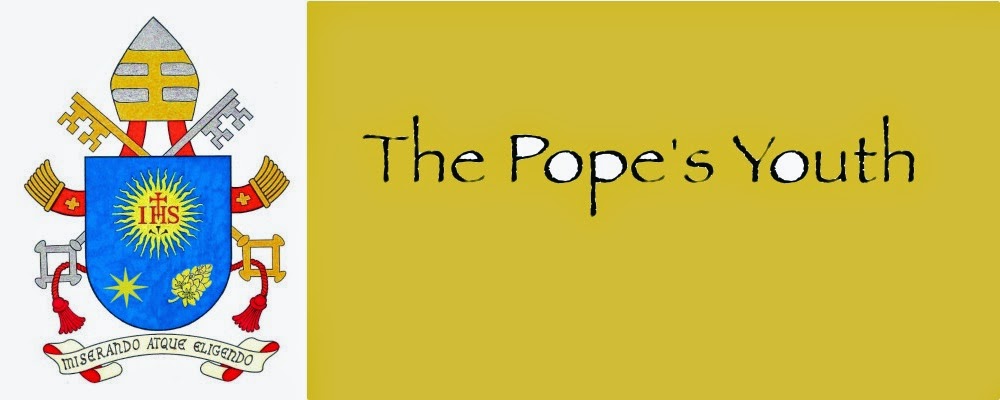The first encyclical of Pope Francis is out. Lumen Fidei, theLight of Faith, was released on Friday on the internet in various languages. It is a rich document, and as the Catholic Church continues its Year of Faith, we will be gnawing on it through November (and onward) until we reach the marrow.
What once was called light has now become associated with darkness (Lumen Fidei 3). Since the 18th century, when the Enlightenment took off and placed Reason as a god, or replaced God with human reason. Reason was the only light. Faith what what kept us in the "Dark Ages", whatever that was supposed to mean. Reason and faith became asunder. Faith was darkness. Reason was the light.
What's the result? Reason, instead of being freed from faith's chains to seek truth, limits itself now believes that truth is subjective, and the only truth we agree on is how technology can make our life more comfortable and easier (LF 25). Reason no longer aspires to great heights of thought. And Faith, instead of being the light that shines forth, becomes the dark cave that Neanderthal men still crawl back into when faced with life's difficult questions like "Who am I? How am I supposed to live? What gives my life meaning?" Now we are all in the dark.
Pope Francis calls to us: "There is an urgent need, then, to see once again that faith is a light, for once the flame of faith dies out, all other lights begin to dim" (LF 4). Faith is a light, as well as reason. They both shine out to aid man make sense of this life. Faith and Reason were never meant to be at odds. St. Peter wrote "Always be ready to give a reason for your hope (1 Peter 3:15)" and like the great saint/philosophy St. Anselm wrote, we have a faith that seeks understanding. I believe, and I seek to understand what I believe. Only Faith, "I just believe" is not good enough. And only reason: I don't have any use for church, is just as bad. We need both if faith and reason are to brighten our way as human beings searching for truth in the material world and in the transcendental.
Faith is a light. But as we see in our own lives, faith will not answer every question. It is not this bright light that reveals all secrets. At least not in this life. But neither will reason alone. When Faith and Reason are joined, we set out to discover new horizons, and this light penetrates our whole life. And this light is not so much like the powerful shining Sun, but more like a lantern light that guides our steps through the darkness.
Pope Francis makes this analogy when talking about how faith will not explain everything, especially not the mystery of pain and suffering:
Faith is not a light which scatters all our darkness, but a lamp which guides our steps in the night and suffices for the journey. To those who suffer, God does not provide arguments which explain everything; rather, his response is that of an accompanying presence, a history of goodness which touches every story of suffering and opens up a ray of light (LF57).
No, faith is not darkness. It is light. A small light, but still brilliant and strong enough to lead us to truth, to "the One who is Truth." And this light "is capable of illuminating every aspect of human existence (LF 4). Not as a blazing Sun, but as a lantern light that is shared by all who believe, which is passed on, and must be passed from generation to generation. Mary is our model for passing on the light. When she said yes in faith, she conceived faith and joy. And just like the Mother of God, when our own spiritual lives bear fruit we become filled with joy, which is the clearest sign of faith’s grandeur (LF 58).
May our lives be filled with the faith that illumines our path.
An apropos poem by Blessed John Henry Newman:
The Pillar of the Cloud |
| {156} LEAD, Kindly Light, amid the encircling gloom |
| Lead Thou me on! |
| The night is dark, and I am far from home— |
| Lead Thou me on! |
| Keep Thou my feet; I do not ask to see |
| The distant scene—one step enough for me. |
I was not ever thus, nor pray'd that Thou |
| Shouldst lead me on. |
| I loved to choose and see my path, but now |
| Lead Thou me on! |
| I loved the garish day, and, spite of fears, |
| Pride ruled my will: remember not past years. |
| {157} So long Thy power hath blest me, sure it still |
| Will lead me on, |
| O'er moor and fen, o'er crag and torrent, till |
| The night is gone; |
| And with the morn those angel faces smile |
| Which I have loved long since, and lost awhile. |
At Sea. June 16, 1833. |

No comments:
Post a Comment